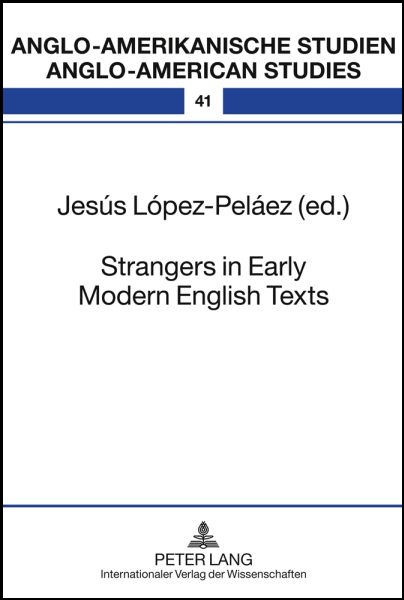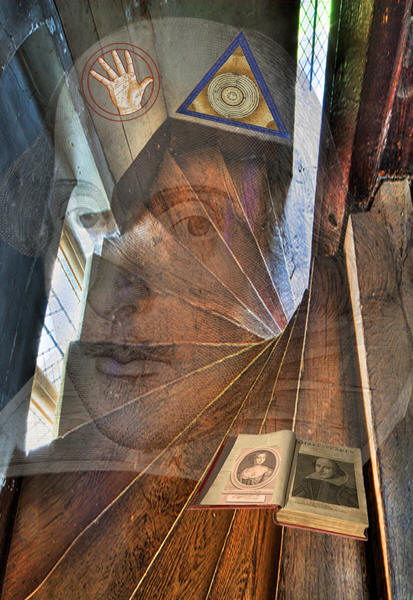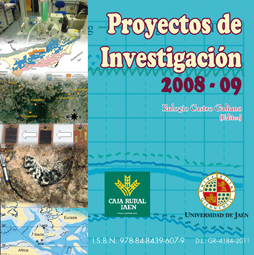Publication of "Strangers in Early Modern English Texts"
 The book Strangers in Early Modern English Texts (Ed. Jesús López-Peláez. Frankfurt & Main: Peter Lang, 2011) has been published in 2011, containing chapters by, among others, the members of the Research Project Muslims, Spaniards and Jews in Early Modern English Texts, describing the basic lines of the research so far. It includes the following chapters: The book Strangers in Early Modern English Texts (Ed. Jesús López-Peláez. Frankfurt & Main: Peter Lang, 2011) has been published in 2011, containing chapters by, among others, the members of the Research Project Muslims, Spaniards and Jews in Early Modern English Texts, describing the basic lines of the research so far. It includes the following chapters:
Introduction. Andrew Monnickendam (Autonomous University of Barcelona, Spain).
1. The Moor in the English Dramatic Mirror: The Term 'Moor' in the Primary Texts of Early Modern English Plays. Luciano García (University of Jaén, Spain).
2. "As we are Englishmen, so are we Men": Patterns of Otherness in George Peele's The Battle of Alcazar. Jesús Nieto and Cinta Zunino (University of Jaén, Spain).
3. Strangers in Marlowe and Shakespeare. John Drakakis (University of Stirling, Scotland, U.K.).
4. The Other Within: Muslims and Moriscos in Shakespeare's Othello and Calderón's Tuzaní. Jesús López-Peláez (University of Jaén, Spain).
5. Alterity in William Shakespeare's Plays The Merchant of Venice and Othello. Rüdiger Ahrens (University of Würzburg, Germany).
6. The Image of the Great Turk after the Ottoman Conquest of Famagusta and Marc Antonio Bragadino's Martyrdom: From its Genesis in the Anti-Turkish Propaganda of Venetian Narratives and Chronicles to its Impact in English Literature. José Ruiz (University of Granada, Spain).
7. Genes and Jabs: Spanish Genealogy as Portrayed by English Protestant Pamphleteers during the Spanish Match Negotiations (1617-1624). Eroulla Demetriou (University of Jaén, Spain).
8. "Virtutem aut vitium sequi genus." Blackness and Moorishness in English Iconography. María Paz López-Peláez (University of Jaén, Spain).
9. Patterns of Female Exploration in Delarivier Manley's Oriental Plays. Yolanda Caballero (University of Jaén, Spain).
For further information about this publication please visit http://www.peterlang.com/index.cfm?event=cmp.ccc.seitenstruktur.detailseiten&seitentyp=produkt&pk=53198&cid=5&concordeid=260140
|
34th International Conference of the Spanish Association of Anglo-American Studies
 The members of the Research Project Muslims, Spaniards and Jews in Early Modern English Texts took part in the 34th International Conference of the Spanish Association of Anglo-American Studies (Asociación Española de Estudios Anglo-Norteamericanos , AEDEAN) held at the University of Almería (Spain), 11-13 November 2010. They contributed with two round tables, entitled "The Representation of Aliens in Early Modern English Texts" (Sessions 8 and 9, November 12, 16:00-17:30, and 18:00-19:30): The members of the Research Project Muslims, Spaniards and Jews in Early Modern English Texts took part in the 34th International Conference of the Spanish Association of Anglo-American Studies (Asociación Española de Estudios Anglo-Norteamericanos , AEDEAN) held at the University of Almería (Spain), 11-13 November 2010. They contributed with two round tables, entitled "The Representation of Aliens in Early Modern English Texts" (Sessions 8 and 9, November 12, 16:00-17:30, and 18:00-19:30):
Panel: Cultural Studies
Session 8 (Round Table)
The Representation of Aliens in Early Modern English texts I (Project FFI2009-13165)
Participants: Jesús López-Peláez Casellas, Chair (University of Jaén), Yolanda Caballero Aceituno (University of Jaén), Jesús Manuel Nieto García (University of Jaén) y Mª Cinta Zunino Garrido (University of Jaén) Session 9 (Round Table)
The Representation of Aliens in Early Modern English texts II (Project FFI2009-13165)
Participants: Luciano García García, Chair (University of Jaén), Eroulla Demetriou (University of Jaén), María Paz López-Peláez Casellas (University of Jaén), José Ruiz Mas (University of Granada).
Abstract
What we know as early modern England was the product of complex and sophisticated social and cultural processes that eventually led to shaping English identity as well as England as a nation-state. This was carried out through the development of discursive and ideological forms and artefacts that confronted other communities, which progressively came to be pointed out for their apparent alterity. Consequently, we suggest that Catholics, Muslims, and Jews are tactically defined through the nascent production of an allegedly coherent English identity based on a community of skin colour, religion, and ideology. We will explore how these processes established dialectical relations with all kinds of cultural artefacts, but most especially with textual ones, which simultaneously inscribe and constitute this process of constructing an English identity. Hence, and given the extent of this research, we propose the constitution of two panels which will explore Elizabethan and Jacobean drama, pamphlets, travel narratives and emblems. Keywords: identity, otherness, Catholicism, Islam, Judaism, Early Modern England.
|
22nd SEDERI Conference: Faces, Façades and Frontispieces: Public and Private Selves in Early Modern Culture
 The members of the Research Project Muslims, Spaniards and Jews in Early Modern English Texts took part in the 22nd SEDERI Conference: Faces, Façades and Frontispieces: Public and Private Selves in Early Modern Culture held in Madrid (Spain) at the Universidad Nacional de Educación a Distancia (UNED), 23-25 March 2011. They participated with the following contributions: The members of the Research Project Muslims, Spaniards and Jews in Early Modern English Texts took part in the 22nd SEDERI Conference: Faces, Façades and Frontispieces: Public and Private Selves in Early Modern Culture held in Madrid (Spain) at the Universidad Nacional de Educación a Distancia (UNED), 23-25 March 2011. They participated with the following contributions:
Wednesday, 23rd March 2011, 12:30 Panel: OTHERNESS.
Chair: Isabel Soto.
Luciano García García. University of Jaén: "'Put the Moors habits on, and paint your faces with the oil of hell': The Representation of Blackness as Damnation in English Dramatic Texts from 1500 to 1660".
José Ruiz Mas. University of Granada: "The Fall of Famagusta and the Development of the Turkish Black Legend in the English Literature of the 18th, 19th, and 20th Centuries". Primavera Cuder. University of Jaén: "The Representation of the Moor in Shakespeare's Othello and Titus Andronicus, and Thomas Dekker's Lust's Dominion".
Friday, 25th March 2011, 11:30
Panel: BLOOD, DIFFERENCE, AND POWER.
Chair: Rafael Vélez Núñez.
Jesús López-Peláez Casellas. University of Jaén: "Paradoxing the Alien: the Morisco in Early Modern English Texts".
Eroulla Demetriou. University of Jaén: "'Rotten from the Root': Spanish Genealogy According to English Anti-Spanish Pamphleteers During the Spanish Match Negotiations (1617-1624)".
|
 The book Strangers in Early Modern English Texts (Ed. Jesús López-Peláez. Frankfurt & Main: Peter Lang, 2011) has been published in 2011, containing chapters by, among others, the members of the Research Project Muslims, Spaniards and Jews in Early Modern English Texts, describing the basic lines of the research so far. It includes the following chapters:
The book Strangers in Early Modern English Texts (Ed. Jesús López-Peláez. Frankfurt & Main: Peter Lang, 2011) has been published in 2011, containing chapters by, among others, the members of the Research Project Muslims, Spaniards and Jews in Early Modern English Texts, describing the basic lines of the research so far. It includes the following chapters: The members of the Research Project Muslims, Spaniards and Jews in Early Modern English Texts took part in the 34th International Conference of the Spanish Association of Anglo-American Studies (Asociación Española de Estudios Anglo-Norteamericanos , AEDEAN) held at the University of Almería (Spain), 11-13 November 2010. They contributed with two round tables, entitled "The Representation of Aliens in Early Modern English Texts" (Sessions 8 and 9, November 12, 16:00-17:30, and 18:00-19:30):
The members of the Research Project Muslims, Spaniards and Jews in Early Modern English Texts took part in the 34th International Conference of the Spanish Association of Anglo-American Studies (Asociación Española de Estudios Anglo-Norteamericanos , AEDEAN) held at the University of Almería (Spain), 11-13 November 2010. They contributed with two round tables, entitled "The Representation of Aliens in Early Modern English Texts" (Sessions 8 and 9, November 12, 16:00-17:30, and 18:00-19:30): The members of the Research Project Muslims, Spaniards and Jews in Early Modern English Texts took part in the 22nd SEDERI Conference: Faces, Façades and Frontispieces: Public and Private Selves in Early Modern Culture held in Madrid (Spain) at the Universidad Nacional de Educación a Distancia (UNED), 23-25 March 2011. They participated with the following contributions:
The members of the Research Project Muslims, Spaniards and Jews in Early Modern English Texts took part in the 22nd SEDERI Conference: Faces, Façades and Frontispieces: Public and Private Selves in Early Modern Culture held in Madrid (Spain) at the Universidad Nacional de Educación a Distancia (UNED), 23-25 March 2011. They participated with the following contributions: The publication Proyectos de Investigación 2008-09 (Ed. Eulogio Castro Galiano) by the University of Jaén has been distributed in November 2011, containing a chapter by the members of the Research Project Muslims, Spaniards and Jews in Early Modern English Texts, describing the basic lines of the research so far.
The publication Proyectos de Investigación 2008-09 (Ed. Eulogio Castro Galiano) by the University of Jaén has been distributed in November 2011, containing a chapter by the members of the Research Project Muslims, Spaniards and Jews in Early Modern English Texts, describing the basic lines of the research so far.